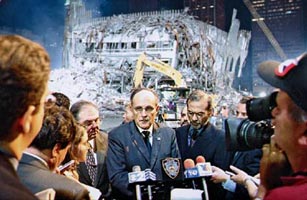
(11 of 11)
It was the night of Sept. 13, and Giuliani was at the police academy command post, where he had been around-the-clock for three days. The 72-hr. wave of adrenaline was wearing off, and he was feeling the strain. The President would be arriving in the morning for his first trip to ground zero. The city was still pretty well closed down. And the casualties were, as Giuliani had predicted, more than anyone could bear. Nobody had been pulled alive from the site since the first night, and the city medical examiner, Dr. Charles Hirsch, was telling him that additional rescues were extremely unlikely. Hirsch cited examples from earthquakes around the world to make the point. Giuliani wasn't ready to abandon hope. "These are New Yorkers," he said. "Give 'em another week."
Nathan could see he was near the end of his rope. (She hadn't realized his rope had an end, but here it was.) They retreated to his tiny office — a nook she had commandeered for him near the coffee lounge. "You need a moment," she told him.
"I probably need a couple," he said.
"Why don't you go for a walk?"
"I can't do that. How can I?"
Nathan showed him how. She knew the deputy mayors would be hovering outside, so she got his security detail to sneak Rudy out the back door of the office, slip him down the fire escape and into the SUV, and drive him off. Nathan stayed behind. "I wanted him to go alone, to be with his thoughts for a little bit," she says. The deputies burst into the room. "Where is he?"
"He went for a walk."
"What? Where?" They were ready to chase him down the street, but he was gone.
When his SUV had made it a block from the command post, Giuliani told the driver to pull over. He got out on First Avenue and walked through Peter Cooper Village, an old brick apartment complex full of middle-class teachers, nurses, cops and office workers — his people. He asked his security team to hang back so he could walk alone. People saw him and did double takes. Some approached quietly, hesitantly; every New Yorker feels entitled to fill the mayor's ear, but not this night. This night they offered him a quick hug or a few soft words of thanks and let him walk on alone. He headed east, through a tunnel under the F.D.R. Drive, toward the East River. "I wanted to look at it," he says. "I wanted to look at the river. It was still there." He turned from the dark water and stared up at the lights. "I looked at the skyline," he says. "It was still there." Then he walked back to work.